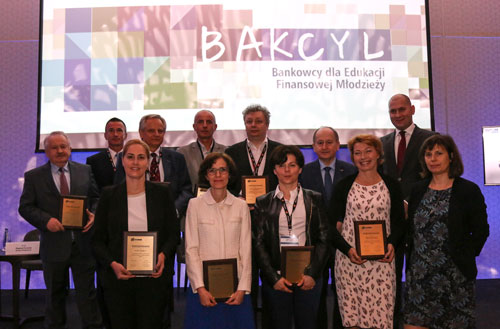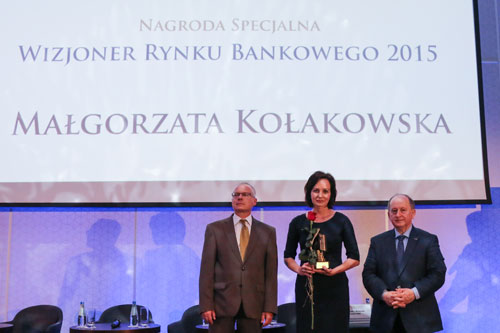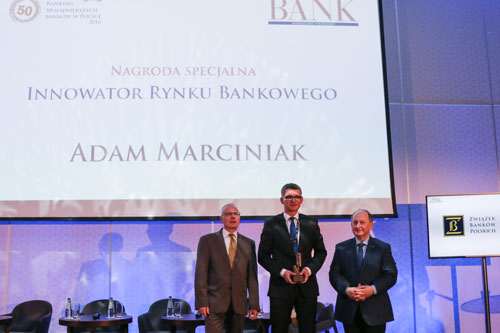Projekt współtworzą banki, których pracownicy w roli wolontariuszy prowadzą lekcje w szkołach. Celem jest wprowadzenie uczniów w wieku gimnazjalnym w świat codziennych finansów, tak aby potrafili wykorzystać dla siebie odpowiednie usługi finansowe na starcie w dorosłość oraz zabezpieczyć swoje potrzeby na przyszłość.
W trakcie ostatnich ważnych wydarzeń sektora bankowego organizator oraz partner projektu składali podziękowania dla partnerskich banków za wkład i zaangażowanie w program BAKCYL. 20 czerwca w trakcie Forum Strategii Bankowych, organizowanego w ramach dorocznych Horyzontów Bankowości przez Centrum Prawa Bankowego i Informacji, Związek Banków Polskich oraz Miesięcznik BANK, podziękowania otrzymały duże banki. Z rąk Krzysztofa Pietraszkiewicza, Prezesa Związku Banków Polskich oraz Marka Radzikowskiego, Prezesa Zarządu Warszawskiego Instytutu Bankowości dyplomy otrzymali: Bank Gospodarstwa Krajowego, Bank BGŻ BNP Paribas, Bank Millennium, Deutsche Bank Polska, Citi Handlowy, ING Bank Śląski, Raiffeisen Polbank, Societe Generale Oddział w Polsce, FM Bank PBP, Toyota Bank oraz Bank Pocztowy. W imieniu wyróżnionych głos zabrała Małgorzata Zdzienicka-Grabarz, Prezes Zarządu Fundacji BGŻ BNP Paribas – Mogliśmy wspólnie, pod jedną flagą, zorganizować projekt, ponieważ wszyscy zgromadziliśmy się, aby zrobić coś dobrego dla innych – podkreśliła Pani Prezes.

Natomiast w trakcie Forum Technologii Bankowości Spółdzielczej, organizowanego w maju przez Centrum Prawa Bankowego i Informacji, Związek Banków Polskich oraz Nowoczesny Bank Spółdzielczy wyróżnienia otrzymały uczestniczące w projekcie BAKCYL banki spółdzielcze. Krzysztof Pietraszkiewicz, Prezes Związku Banków Polskich oraz Waldemar Zbytek, Wiceprezes Zarządu Warszawskiego Instytutu Bankowości wręczyli podziękowania dla Warszawskiego Banku Spółdzielczego, Polskiego Banku Spółdzielczego w Ciechanowie, Mazowieckiego Banku Spółdzielczego w Łomiankach, ESBANKu Banku Spółdzielczego, Banku Spółdzielczego w Sztumie, Poznańskiego Banku Spółdzielczego oraz Banku Spółdzielczego w Koronowie. Teresa Kudlicka, Prezes Zarządu Banku Spółdzielczego w Płońsku podkreśliła, że ważną korzyścią dla banku z uczestnictwa w projekcie jest możliwość rozwoju zawodowego pracowników.

W ramach wydarzeń towarzyszących Horyzontom Bankowości 20 czerwca odbyły się także spotkania: Rady Projektu BAKCYL oraz Koordynatorów Projektu BAKCYL w partnerskich bankach. Rada Projektu BAKCYL zaakceptowała plany rozwoju projektu. Jako cel na najbliższe miesiące przyjęto, aby do końca kwietnia 2017 roku przygotować grupy wolontariuszy gotowych do prowadzenia lekcji BAKCYLA w każdym województwie na terenie kraju. Tym samym BAKCYL stanie się projektem ogólnopolskim.
Od 2013 roku, kiedy projekt BAKCYL został uruchomiony, do końca bieżącego roku szkolnego odbyło się już blisko 1250 lekcji dla 27.000 uczestników w 6 województwach. Dzięki planowanemu rozwojowi i objęciu działaniem BAKCYLA całej Polski, organizatorzy projektu zakładają co najmniej podwojenie tych liczb do końca 2017 r.
Warszawski Instytut Bankowości

















 2. The word “bankrupt” is from the Italian banca rotta, literally “broken bench.” In the years of early banking, people who exchanged, stored, and lent money did their business in the public marketplace at a bench. If the man at the bench, or the “banker,” ran out of money or was unfair, his bench would be broken. (Source:
2. The word “bankrupt” is from the Italian banca rotta, literally “broken bench.” In the years of early banking, people who exchanged, stored, and lent money did their business in the public marketplace at a bench. If the man at the bench, or the “banker,” ran out of money or was unfair, his bench would be broken. (Source:  3. In the mid-1990s in Japan, a company called Hitachi introduced an ATM that would sterilize bank notes. According to Forbes, this was done by heating them to 392 degrees. Although a novel idea, the notes are re-contaminated as soon as they are touched by human hands. (Source:
3. In the mid-1990s in Japan, a company called Hitachi introduced an ATM that would sterilize bank notes. According to Forbes, this was done by heating them to 392 degrees. Although a novel idea, the notes are re-contaminated as soon as they are touched by human hands. (Source:  4. It took the city of Montreal 30 years to pay off its Olympic debt of $2 billion, held in 1976. (source:
4. It took the city of Montreal 30 years to pay off its Olympic debt of $2 billion, held in 1976. (source:  5. U.S. paper money is not paper. It's cloth. In Ben Franklin’s day, people repaired torn bills with a needle and thread. (source:
5. U.S. paper money is not paper. It's cloth. In Ben Franklin’s day, people repaired torn bills with a needle and thread. (source:  6. Government of India's first set of notes was the Victoria portrait series. For security reasons, the notes of this series were cut in half; one half was sent by post, and upon confirmation of receipt, the other half was sent. (source:
6. Government of India's first set of notes was the Victoria portrait series. For security reasons, the notes of this series were cut in half; one half was sent by post, and upon confirmation of receipt, the other half was sent. (source: 
 Security is certainly a major challenged faced not only by the cooperative banking sector. Equally important is the implementation of a new business model for cooperative banking. The market situation and need to optimise our operations as well as the opportunities which arise for cooperative banking make us re-define the role of an associating bank. It should be predominantly an apex bank, whose fundamental role would be to support the associated Cooperative Banks.
Security is certainly a major challenged faced not only by the cooperative banking sector. Equally important is the implementation of a new business model for cooperative banking. The market situation and need to optimise our operations as well as the opportunities which arise for cooperative banking make us re-define the role of an associating bank. It should be predominantly an apex bank, whose fundamental role would be to support the associated Cooperative Banks.
